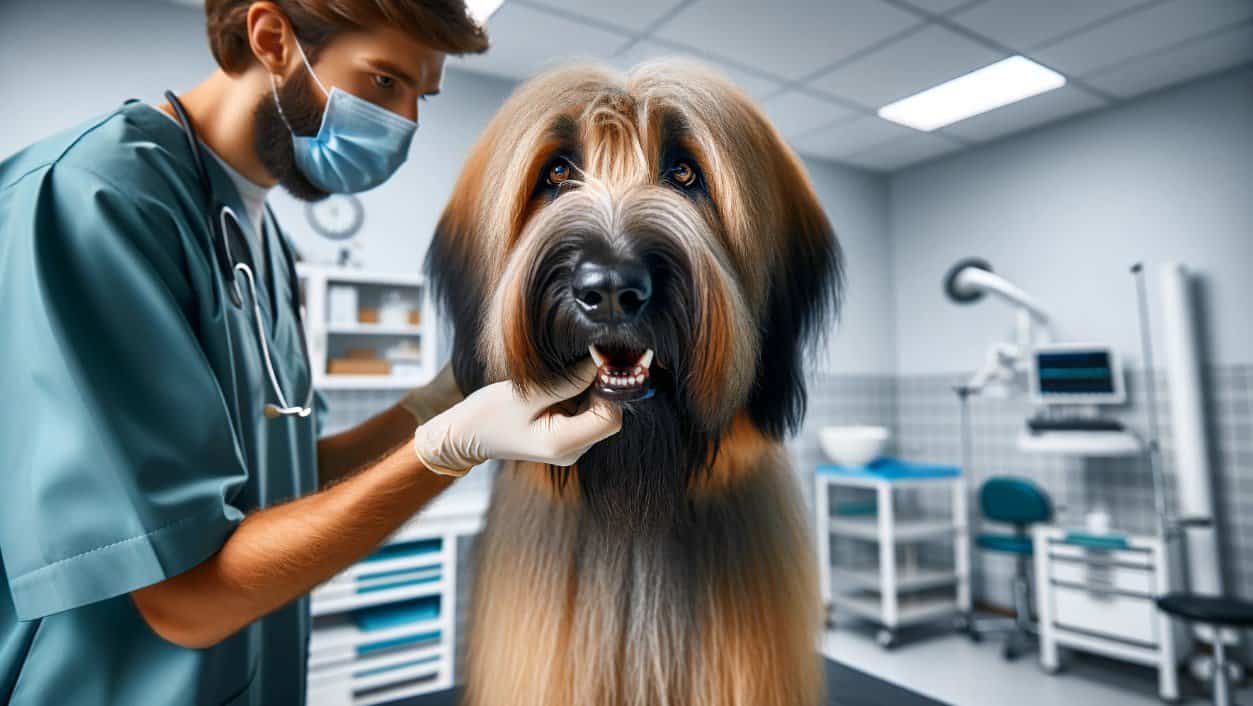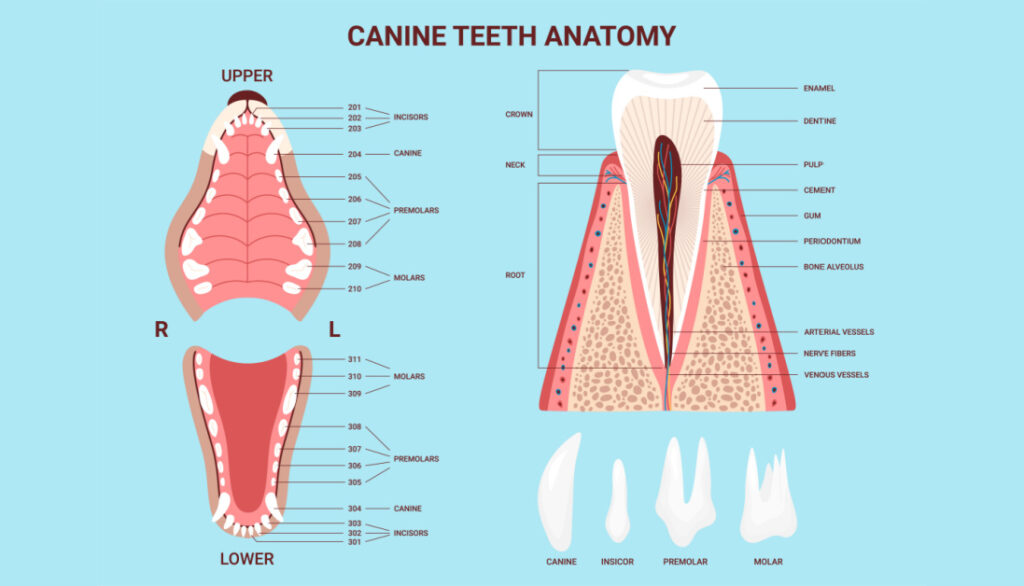Hello there, fellow dog parent! I’m Dr. Candy, your friendly holistic veterinarian. Today, we’re going to talk about a topic that’s close to my heart and crucial for our furry friends – Briard Dental Health. Now, if you’re a Briard parent like me, you know that these dogs are not just pets; they’re family. And just like any family member, their health is of utmost importance.
One aspect of our Briard’s health that often gets overlooked is their dental health. But did you know that maintaining good oral hygiene is as essential for your Briard as it is for you? That’s right! Poor dental health can lead to a host of other health issues, including heart disease and kidney problems.
So, let’s get down to it and explore the world of Briard Dog Dental Care. We’ll discuss the signs of dental disease, common dental health issues in Briards, and the best ways to keep your Briard’s teeth sparkling clean. Remember, a healthy mouth equals a healthy dog. So, let’s make sure our Briards are as healthy as they can be!

Signs of Dental Disease in Briard
As a loving Briard parent, I know how crucial it is for you to ensure your furry friend is always in the best of health. A vital, yet often overlooked aspect of their well-being, is their dental health. Recognizing the signs of dental disease in your Briard can be the difference between early intervention and serious health complications.
The first telltale sign of a potential dental issue is bad breath. While it’s common for dogs to have a certain level of ‘doggy breath’, an unusually foul odor could indicate a buildup of bacteria, which can lead to gum disease. If you notice that your Briard’s breath is consistently unpleasant, it’s time for a closer look.
Another sign of dental disease is a change in eating habits. If your Briard is usually a voracious eater but suddenly becomes hesitant or shows discomfort while eating, they could be experiencing dental pain. Similarly, excessive drooling or a sudden loss of appetite can also signal dental issues.
Visible changes in your Briard’s mouth are also a cause for concern. Red, swollen, or bleeding gums, yellow or brown tartar buildup on the teeth, loose or missing teeth are all signs of dental disease.
Don’t overlook behavioral changes either. If your Briard seems unusually irritable, is pawing at their face, or has lost interest in their favorite chew toys, they could be suffering from dental discomfort.
Finally, keep an eye out for any abnormal lumps or growths in your Briard’s mouth. While these could be benign, they could also indicate oral tumors, which are unfortunately common in dogs.
As a holistic veterinarian, I can’t stress enough the importance of regular dental check-ups for your Briard. Early detection is key in addressing dental issues and preventing them from escalating into more serious health problems. Remember, your Briard’s dental health is a crucial part of their overall well-being.
Key takeaway: Regular monitoring of your Briard’s dental health and being alert to the signs of dental disease can help ensure a long, healthy, and happy life for your furry friend.
Next, let’s delve into some common dental health issues your Briard might face, and how we can address them. Remember, when it comes to your Briard’s dental health, prevention is always better than cure.
Common Dental Health Issues In Briard
As a dedicated dog parent, you’re probably aware that your Briard’s dental health is just as important as their physical health. In my years as a veterinarian, I’ve noticed that Briards are prone to certain dental health issues. Let’s delve into these to ensure your furry friend maintains a healthy smile.
Periodontal Disease: This is the most common dental issue in Briards. Just like in humans, plaque and tartar build-up can lead to gum inflammation, often resulting in periodontal disease. If left untreated, it can cause tooth loss and even affect the heart, liver, and kidneys.
Broken Teeth: Briards are known for their playful and energetic nature. However, this can sometimes lead to broken or fractured teeth, especially when they chew on hard objects. Broken teeth can cause severe pain and lead to infections.
Oral Tumors: Although not as common, oral tumors can occur in Briards. Regular dental check-ups can help detect these tumors early.
Understanding these common dental issues in the Briard breed is the first step towards maintaining your dog’s oral health. Regular brushing, professional cleanings, and a balanced diet can go a long way in preventing these issues. Remember, a healthy mouth contributes significantly to your Briard’s overall health and well-being.

Conventional Dental Health Treatments
When it comes to maintaining your Briard’s dental health, there are several conventional treatments available. One of the most common procedures is anesthetic dental cleanings. This involves putting your Briard under anesthesia and thoroughly cleaning their teeth and gums. This process can help prevent the buildup of tartar and plaque, which can lead to serious dental diseases like gingivitis and periodontitis.
Anesthetic Dental Cleanings
Anesthetic dental cleanings are a highly effective way to maintain your Briard’s oral health. However, they should be done by a professional veterinarian and are typically recommended once or twice a year, depending on your dog’s oral health condition. While under anesthesia, the vet will remove any tartar and plaque, clean the teeth, and examine the mouth for any signs of disease.
It’s important to note that while anesthesia is generally safe, there are potential risks. Your vet should perform a thorough examination before the procedure to ensure that your Briard is healthy enough for anesthesia.
Potential Individual Health Obstacles
While anesthetic dental cleanings are beneficial, it’s crucial to consider your Briard’s overall health. Certain health conditions can make anesthesia riskier. These include heart problems, drug sensitivities, seizures, and extreme age.
- Heart Problems: If your Briard has a heart condition, anesthesia could pose a risk. Your vet will need to monitor their heart closely during the procedure.
- Drug Sensitivities: Some Briards might be sensitive to certain anesthetic drugs. Always inform your vet about any known sensitivities or adverse reactions your dog has had in the past.
- Seizures: If your Briard suffers from seizures, anesthesia could potentially trigger an episode. It’s vital to discuss this with your vet before the procedure.
- Extreme Age: Older Briards might have a harder time recovering from anesthesia. If your Briard is of extreme age, your vet might recommend alternative treatments.
Remember, your Briard’s dental health is crucial for their overall well-being. Regular check-ups and cleanings can help keep their teeth and gums healthy. However, always consider their overall health and discuss any potential risks with your vet before deciding on any treatment.
Dr. Candy’s Holistic Approach To Oral & Dental Health
As a dedicated pet parent, you’re probably always on the lookout for ways to boost your Briard’s health, right? Well, when it comes to Briard dental health, there’s a lot you can do to help your furry friend. Let’s dive into Dr. Candy’s holistic approach to oral and dental health.
Diet- Low Carbs, Avoid Added Sugars, Enzymes In Fresh Food
Firstly, let’s talk about diet. A diet low in carbs and free from added sugars is essential for maintaining your Briard’s dental health. Consuming too many carbs can lead to plaque buildup, while added sugars can cause tooth decay. So, feed your Briard a balanced diet filled with fresh foods that are rich in enzymes. These enzymes help to break down food particles and prevent them from sticking to your dog’s teeth.
- Raw veggies: Raw vegetables like carrots and celery are not only low in carbs but also act as natural toothbrushes, scrubbing away plaque as your dog chews.
- Lean meats: Lean meats are a great source of protein and are low in carbs. They also contain enzymes that can help to clean your dog’s teeth.
- Fresh fruits: While some fruits can be high in natural sugars, they are also packed with essential vitamins and enzymes. Just be sure to limit portions to avoid excessive sugar intake.
Oral Health Specific Probiotics
Next up, let’s discuss probiotics. These beneficial bacteria can do wonders for your Briard’s oral health. They balance the oral microbiome, preventing harmful bacteria from taking over and causing dental diseases. One such product is Probiora for Dogs, an oral health targeted probiotic. It’s specifically designed to support your dog’s oral health, and I’ve seen some fantastic results with it. You can check it out here.
Remember, every dog is unique and what works for one Briard may not work for another. It’s always best to consult with your vet before making any significant changes to your dog’s diet or introducing new supplements. Together, you can create a personalized plan to improve your Briard’s dental health.

Recommended Dental Chews & Products For Briard
As a caring pet parent, you might be tempted to reach for commercially promoted dental chews in the hopes of maintaining your Briard’s dental health. However, you should be aware that these products often fail to deliver on their promises. These dental chews are usually filled with artificial flavors and preservatives, which can be harmful to your dog’s overall health. Furthermore, they often don’t provide the necessary mechanical action needed to effectively remove plaque and tartar.
Another common product you might consider are drinking water additives. However, these can inadvertently harm the beneficial bacteria in your dog’s gut, potentially leading to digestive issues. So, it’s essential to look for alternatives that support your Briard’s dental health without compromising their overall wellbeing.
Dr. Candy’s Recommended Dental Chews & Products
When it comes to maintaining your Briard’s dental health, natural is always the best way to go. Here are some of Dr. Candy’s top recommendations:
- Single Source Natural Proteins: These include tendons, raw marrow bones, and bully sticks. These products are not only delicious for your Briard but also provide the necessary mechanical action to clean their teeth effectively. They are rich in natural enzymes that help break down plaque and tartar, promoting better oral hygiene.
- Dental Health Specific Probiotics: As mentioned earlier, maintaining a healthy gut flora is crucial for your Briard’s overall health. Probiotics designed for dental health can help balance the bacteria in your dog’s mouth, preventing the buildup of harmful bacteria that leads to dental diseases.
- Raw Diet: A raw diet can be beneficial in maintaining your Briard’s dental health. Raw foods are not only rich in natural enzymes but also require more chewing. This increased chewing can help clean your dog’s teeth and gums, reducing the risk of plaque and tartar buildup.
Remember, each dog is unique, and what works for one might not work for another. It’s essential to monitor your Briard’s reaction to these products and make adjustments as necessary. Also, regular veterinary check-ups are crucial to ensure your Briard’s dental health is on track.
With the right care and attention, you can help ensure your Briard enjoys a healthy, happy life with a sparkling smile. Keep in mind that Briard Dental Health is not just about preventing bad breath but also about enhancing your furry friend’s overall wellbeing.

Frequently Asked Questions
1. What causes bad breath in Briards?
Bad breath in Briards can be caused by various factors such as poor dental hygiene, gum disease, tooth decay, or underlying health issues. It is important to regularly brush your Briard’s teeth and schedule dental check-ups to prevent bad breath.
2. How can I improve my Briard’s dental hygiene?
To improve your Briard’s dental hygiene, you should brush their teeth regularly using a dog-specific toothbrush and toothpaste. Additionally, providing dental chews or toys designed to promote oral health can help reduce plaque and tartar buildup.
3. Are there any specific dental products recommended for Briards?
There are several dental products recommended for Briards, including toothbrushes with soft bristles, enzymatic toothpaste formulated for dogs, dental rinses, and dental treats. It is advisable to consult your veterinarian for specific product recommendations based on your Briard’s needs.
4. How often should I schedule dental check-ups for my Briard?
It is recommended to schedule dental check-ups for your Briard at least once a year. Regular check-ups allow the veterinarian to assess your dog’s dental health, perform professional cleanings if necessary, and address any potential dental issues before they worsen.
5. Can bad breath in Briards be a sign of a more serious health problem?
Yes, bad breath in Briards can sometimes indicate an underlying health problem such as periodontal disease, oral infections, gastrointestinal issues, or metabolic disorders. If your Briard’s bad breath persists despite proper dental care, it is advisable to consult a veterinarian for a thorough examination.
